Spectacular Eco-Conscious Safari Spots
With the world – finally – looking more closely at environmental practices and conservation of our precious natural resources, we thought it a good time to put together a list of eleven of our favourite eco-conscious lodges in Africa.
How can safari destinations be eco-conscious?
This is a very valid question to ask. Environmental awareness not only encompasses the preservation of indigenous species (both animals and plants) and the environment itself, but also needs minimise the impact of humans on the ecology. Not only that, the inclusion of local communities and preservation of local culture is vital. There are a number of ways that this is done.
Water
 Three Zebra Drinking by Ralf Kayser
Three Zebra Drinking by Ralf Kayser
In many safari destinations, water is the most precious commodity there is. The way a camp handles water issues is vital. Sustainable tourism practices recommend that water consumption be limited to 20 litres per tent. This is completely doable, even with flushing toilets and hot showers, if rain water collection and recycling of water is practiced.
Waste
Humankind – when not aware – creates a vast quantity of waste. Safari spots with an eco-conscience ensure that no waste reaches the wild animals (or bush) and ensure that minimal waste is generated and that everything possible is recycled.
Electricity
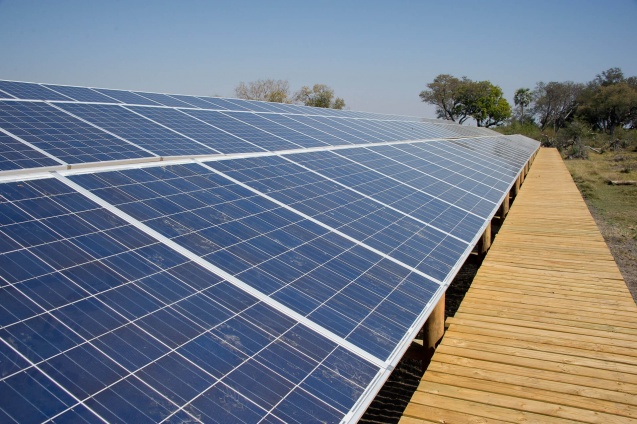 Solar Panels at Xigera by Xigera Camp
Solar Panels at Xigera by Xigera Camp
Often there is no electricity in more remote spots, necessitating generators, which run on petrol and diesel. This is not ideal. Solar panels are becoming more common, as are environmentally-friendly combustibles and sustainable wood sources.
Building Practices
Transporting building materials from urban areas and, worse, importing marble tiles from Europe are ecologically damaging. Many places now build with locally-sourced materials and décor, providing a far more environmentally-friendly and more real African experience. This also feeds into the local economy.
Social Consciousness
 Ovahimba Mother and Child by David Siu
Ovahimba Mother and Child by David Siu
An important factor to take into consideration is how the local population are affected by tourism. Does it positively impact the lives of the locals? Many places provide not only employment and training to locals, but also contribute financially to the infrastructure of the area (schools, clinics, etc.)
Animal Interactions
There’s only one ethical answer to this: no. African animals are wild and should remain so. Riding elephants, cuddling cubs, walking with cheetahs … just don’t. You’re not doing them any favours. If you want to see them up close, do some research first, and visit ethically-sound conservation centres.
Our Favourite Eco-Conscious Spots
So, which are our favourite eco-conscious safari spots? It’s hard to choose because there are so many incredible places doing amazing things, but we managed to narrow it down to eleven:
Chole Mjini, Tanzania
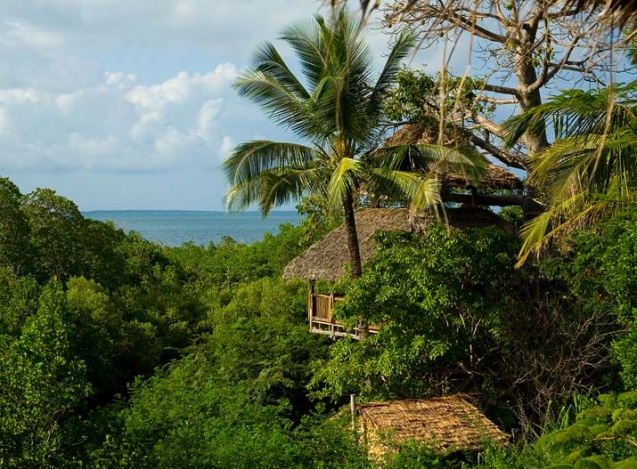 Chole Mjini by Chole Mjini
Chole Mjini by Chole Mjini
This little paradise on an island off Tanzania is the Poster Child for ecotourism. Owners, Anne and Jean, with the help of local islanders built it from scratch, using only human power and locally-sourced materials.
Living in a treehouse, each one private, spending days snorkelling and diving amongst whale sharks in the gorgeous waters off the island, exploring the ruins, or just reading a book undisturbed by mobile phones, Chole Mjini is sheer bliss.
It’s not high-end luxury, but therein lies its beauty. Simple, yet comfortable, it’s an ecotourist’s dream.
The Chole Mjini Charitable Trust, administered by and accounted for by the local commnity, with Chole Mjini's help and foreign donors, runs a number of village projects and supports the local hospital, school, market and community centre. A scholarshp programme supports between 50 and 100 Chole island kids each year in secondary and tertiary education and has already put more than 100 kids through high school and produced 14 university graduates (in a community that had only one primary school leaver and no high school graduate when they started the trust).
Pamushana Lodge, Zimbabwe
__medium.jpg) Pamushana Lodge by Singita
Pamushana Lodge by Singita
Situated in the Malilangwe Wildlife Reserve in a lesser-known area of south-eastern Zimbabwe next to Gonarezhu National Park, Pamushana Lodge pushes its income into numerous conservation and community projects in the area.
Built to mimic the organic shapes of Great Zimbabwe, Pamushana’s luxurious suites and villa blend into the exquisite bush of the area and offer beautiful views from its hilltop location.
There is major focus on conservation – with a very successful rhino reintroduction programme at Malilangwe, amongst other projects – and the preservation of cultural heritage, with the fascinating Kambako Living Museum of Bushcraft nearby.
Serra Cafema, Kunene, Namibia
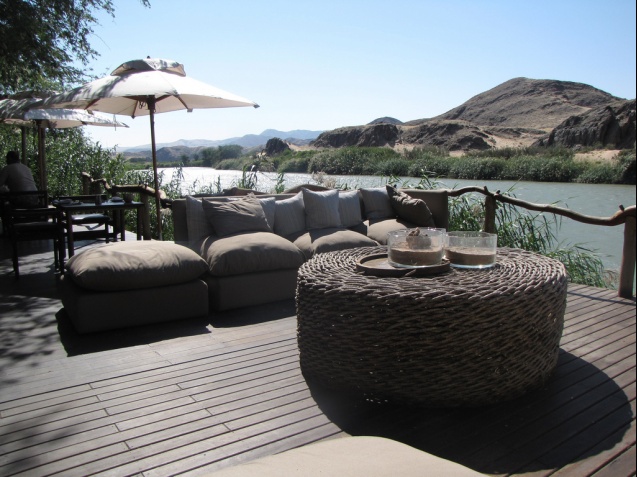 Serra Cafema by James Whatley
Serra Cafema by James Whatley
Serra Cafema, located in the far north of the Namib Desert, is about as remote as you can get. The land it occupies is leased from the Marienfluss Conservancy, which is primarily owned by the local Himba people. A good relationship has been established, allowing visitors to get a glimpse into the Himba culture while visiting the camp.
The camp, consisting of eight luxurious canvas and thatched villas set along the river bank, in the midst of the desert, are powered by a hybrid system of solar- and generator-power, and they are involved in numerous conservation projects including the studying of the crocodiles who live around the camp.
Xigera Camp, Okavango, Botswana
 Xigera Camp by Xigera
Xigera Camp by Xigera
It’s hard to describe the beauty of the Okavango Delta, with its pristine air and clear waterways. It is ecologically fragile and that’s why we love the gorgeous Xigera Camp, situated on Paradise Island in the Moremi Game Reserve.
With nine raised luxury tents, power is generated solely by an incredible photovoltaic solar plant and all waste water is run through an Above Ground Sewerage Plant to ensure that nothing that shouldn’t go into the environment does. Staff are also involved with the local AIDS counselling centre.
Zarafa Camp, Botswana
 Zarafa Camp by Zarafa
Zarafa Camp by Zarafa
Similar systems keep the beautiful and remote Zarafa Camp, in far northern Botswana (Selinda Reserve), running. Perfectly located overlooking a lagoon, this exclusive camp consists of just four tented villas and a main lodge, all raised to give spectacular views.
Everything used in its construction was recycled and repurposed – including the mahogany furniture made from wood washed up in the 2005 tsunami, which provided much-needed work to Indonesians affected by the disaster.
With electricity generated only by the sun, a bio-gas plant recycling waste into usable gas, and a water filtration system allowing for the elimination of plastic water bottles, Zarafa has a carbon footprint they can be very proud of!
Mwaleshi Camp, Luangwa, Zambia
 Mwaleshi Camp by Mwaleshi
Mwaleshi Camp by Mwaleshi
Ten kilometres upstream from the confluence of the Mwaleshi River and the Luangwa, in the remote North Luangwa National Park, lies Mwaleshi Camp. Four simple thatched chalets, rebuilt each year after the wet season with local materials, open up onto the Mwaleshi River. Uninterrupted views, seclusion and walking safaris give a true African experience.
Mwaleshi Camp is run by a company who, through their Tafika Fund, support numerous local projects including a school, scholarship programme and an outpatient clinic in the area.
Elsa’s Kopje, Meru, Kenya
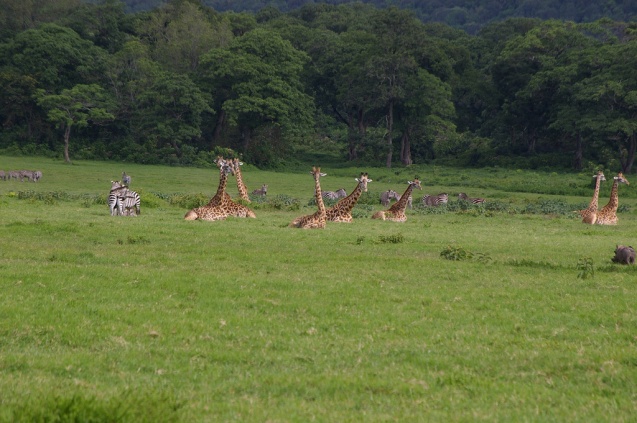 Tired Giraffe in Meru by ActiveSteve
Tired Giraffe in Meru by ActiveSteve
Built in 1999 in Kenya’s spectacular Meru National Park, Elsa’s Kopje has adapted with the times and now boasts numerous eco-friendly practices including solar energy (bringing their generator running time down to six hours per day), recycling of by-products and supporting the local community.
Hugely successful animal conservation efforts in this once disintegrating park have seen the reintroduction of many previously wiped-out species such as reticulated giraffe and leopard.
Sculpted into Mughwango Hill, this lodge is the height of African romance in a wonderfully rugged and remote part of Kenya.
Mkulumadzi Lodge, Malawi
 Mkulumadzi Lodge by Robin Pope
Mkulumadzi Lodge by Robin Pope
Majete Wildlife Reserve – Malawi’s only Big Five reserve – lies in southern Malawi. Mkulumadzi Lodge is beautifully remote and offers visitors luxurious accommodation in eight chalets set out along the Shire River. Each chalet has a garden on its sloped roof – indigenous succulents, aloes and grasses help to keep them cool.
Mkulumadzi is fully solar-powered with environmentally-friendly ‘evening-breeze’ air-conditioned beds for the uncomfortably hot season. The company that owns it prides itself on its commitment to conducting business in a manner that benefits the environment and wildlife conservation, the people who work for them, and their neighbouring communities, through a large number of projects.
Nkwichi Lodge, Malawi
__medium.jpg) Nkwichi Lodge by TravelingOtter
Nkwichi Lodge by TravelingOtter
A little further north, on the shores of Lake Malawi, lies the paradise of Nkwichi Lodge. With white sandy beaches and luxurious chalets and houses (including the spectacular Star Bed!) overlooking the azure waters of the lake.
Nkwichi is an integral part of Manda Wilderness Project. This is an initiative to bring the community together to ensure environmental sustainability and local benefit. Nkwichi forms one of the three parts (tourism, the other two being conservation and community development), attracting visitors to their low impact lodge, training staff and raising both local and international awareness.
Leshiba, Soutpansberg, South Africa
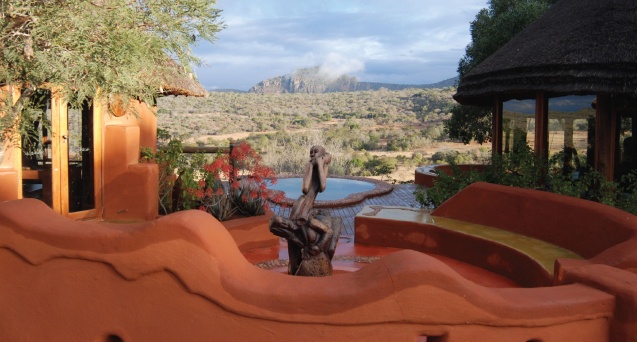 Venda Village Lodge by Leshiba
Venda Village Lodge by Leshiba
The Soutpansberg, in northern Limpopo, is an often-missed area of incredible beauty and rich culture and heritage (Vha Venda). Leshiba offers a range of eco-friendly accommodation with views across the mountains and fabulous Venda sculptures incorporated into the buildings themselves.
Emphasis is placed on the development of the arts, as this area is known for its artistic talent and skillful wood carvers. The Leshiba Venda Arts and Culture Trust aims to ensure the integration of cultural heritage with appropriate technology to uplift communities and to focus on sustainable development.
Garonga Camp, Makalali, South Africa
 Safari Camp by Garonga
Safari Camp by Garonga
The six luxurious tent-and-wall units at Garonga Safari Camp blend into the bush perfectly. Each with their own deck overlooking the dry riverbed, they have incredible views. It’s situated in the Makalali Conservancy, just 90 minutes from Kruger’s Phalaborwa Gate, and game drives offer, if you’re lucky, sightings of not only the Big Five, but plenty more.
Garonga pride themselves on their green actions – 30% of their energy requirements are met by solar energy, heat pump systems for hot water reduce electricity consumption by 80%, a bio-gas system recycles waste into usable gas for cooking, a vegetable garden on site contributes to food requirements and a water treatment plant ensures that all waste water is filtered, cleaned and reused (by the animals at the camp’s waterhole!)
Bonus: Bakwena Lodge, Chobe, Botswana
 Bakwena Lodge by Bakwena
Bakwena Lodge by Bakwena
Bakwena Lodge is one of our favourite places to stay. Owners, Adam and Jenny Young, designed the lodge to be environmentally-sensitive from every angle. Bakwena consists of eco-beam structures filled in with sandbags. Read all about it in a piece we published on Africa Geographic.
As we said at the beginning, these are just eleven of our favourites, and it was hard to pick just eleven! Many camps and lodges are doing fantastic stuff when it comes to greening, sustainability and eco-tourism. Choose your safari destinations carefully and you’ll not only be having the experience of a lifetime, but contributing to making sure that your children’s children will be able to do the same!
Pack for a Purpose
 Colouring Pencils by Kain Kalju
Colouring Pencils by Kain Kalju
Many places are part of the international project ‘Pack for a Purpose’. It is a non-profit organization that provides travellers with up-to-date information about needed supplies for community-based projects supported by accommodations around the globe. Travellers use their luggage to take school, medical and other supplies to the communities they visit.
Visit their website before you travel and make a meaningful contribution.


 Briony is a qualified pharmacist, published author and travel blogger living in Cape Town. She writes her own blog about travel, the arts, music and the good things in life, with a focus on accessibility. She likes watching the world go by, and sometimes it makes her nose twitchy, but mostly it provides golden nuggets with which to light up the page.
Briony is a qualified pharmacist, published author and travel blogger living in Cape Town. She writes her own blog about travel, the arts, music and the good things in life, with a focus on accessibility. She likes watching the world go by, and sometimes it makes her nose twitchy, but mostly it provides golden nuggets with which to light up the page.




